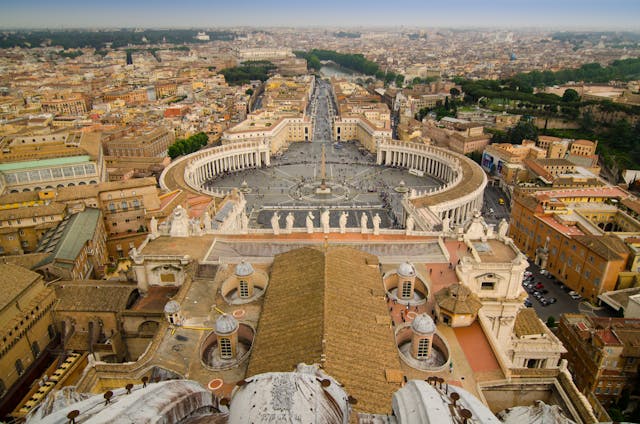
Does the Vatican have a secret library? No. The Vatican doesn’t have a secret library. There are some sections that are restricted, and there are some recent records that are off limits, but no more than many other government libraries and there are certainly some governments that are much more secretive.
The Vatican library is enormous. That isn’t really surprising considering that the Roman Catholic church has a history going back over 1500 years. The library has only existed in its present location since 1475, but the Catholic church has owned a library and book collections for much longer than that. The books were kept in many locations, but the center of the church has always been Rome and it made sense to keep all of the books there. It is said to be one of the oldest libraries in the world and it has manuscripts and scrolls going back to the 4th century. The oldest book it has is the Codex Vaticanus, which is a Christian copy of a Greek bible that has been dated to about 325 AD. The library contains over 1.5 million books and manuscripts. 8.600 books that were printed before 1500. It has coins, works of art, antiquities, and a whole range of other things. There are over 100,000 letters from the first half of the 14th century alone! The library is estimated to have over 85 km of shelving!
So, is there a secret library? There is a section called the Vatican Apostolic Archive, which has been called the Vatican Secret Archive, but secret doesn’t mean what we think it means. Thanks to Dan Brown and his books, we assume that the Vatican are hiding things from us, but the library is private more than secret. The word “secretum” in Latin means private. It basically contains state papers, correspondence, accounts, and other documents that pertain to the running of the state. However, this section is most certainly not secret and any scholar can view the documents if they like. It is not easy to get permission to go in, but it is not impossible. You need to have a letter of recommendation from a university or a research institution, or a recognized scholar. Then you have to undergo an interview to make sure you are who you say you are and your reasons are true. If you are successful, the Vatican will write to you with permission and the date you can attend. Once you are inside, there are pretty strict rules as well. You are not allowed ink pens or photography equipment. You must wear gloves and the books you have requested are brought to you. You can only request up to five books a day. All of this doesn’t make the archives secret, it just means that the Vatican are doing what they can to protect their collection of ancient books. You would get exactly the same treatment and have to go through the same steps if you requested to see an ancient book in the Bodleian Library in Oxford.
There are still some documents that are restricted. The Vatican archives were first opened up in 1881 when Pope Leo XIII was persuaded to open them up to historians. People started to study the documents in depth. Before this, the documents hadn’t really been secret, more restricted. Also, there wasn’t a huge amount of interest in them until probably the end of the 18th century. The study of history was not a common pastime until probably the time of the Industrial Revolution. In 1979 a historian called Carlo Ginzburg requested access to all of the archives of the Roman Inquisition, which was granted. Since then, when somebody wants to see a document, they are generally granted access. The documents that are still restricted are any correspondence or documents related to the current state and pope. Documents are made public 75 years after the end of a pope’s reign, which almost always means their death. This can be waived by other popes and sometimes is.
The Vatican Library is a candy shop for historians. When we study history at school, we learn about numerous important events that changed the course of history and many of the documents connected to these events are kept in the Vatican Library! Henry VIII’s request for a marriage annulment, which led to the foundation of the Church of England. The records of the trial of Galileo and the trials of the Knights Templar. The papal bull excommunicating Martin Luther. Correspondence with historical figures, such as Napoleon, and various monarchs. And so many other things that would fascinate any historian. But none of them are secret. And this is what I learned today.
Photo by Aliona & Pasha: https://www.pexels.com/photo/aerial-view-of-vatican-city-3892129/
Sources
https://www.history.com/news/step-into-the-vaticans-secret-archives
https://en.wikipedia.org/wiki/Vatican_Apostolic_Archive
https://en.wikipedia.org/wiki/Vatican_Library
https://carpediemtours.com/blog/secrets-of-the-vatican-library

Pingback: Why is the Forbidden City forbidden?
Pingback: #1018 Why are the Secret Service in charge of protecting the president of the USA?
Pingback: #254 Who burned down the Library of Alexandria?